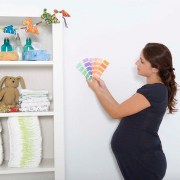 Photo: Getty Images
Photo: Getty Images
Water-based latex paints produce fewer solvent fumes than the older solvent-based paints, but they may still increase the risk of allergic disease in young children, according to Dr. Hyonok Choi and collaborators. Choi, at the Harvard School of Public Health in Boston, Massachusetts, studied the relationship between common household chemicals and allergy in preschool children along with researchers in Sweden, Norway, and China.
An enormous variety of chemicals has been introduced into our environment since the end of World War II, Choi noted. Volatile organic compounds and semi-volatile organic compounds can persist for years in indoor atmospheres. Two medical literature reviews have linked allergy and asthma symptoms to residential chemicals from painting, particle board, plastic materials, home cleaning agents, air fresheners, and pesticides.
Choi and coauthors identified eight classes of volatile organic compounds for their study: aldehydes, alkanes, aromatic hydrocarbons, dimethylalkanes, propylene gylcol and glycol ethers (PGEs), methlyalkanes, organic acids, and texanols. They performed a case-control study of 400 children in Varmland, Sweden, to see whether children with allergies had higher exposure to these chemicals, compared to children with similar demographics but without allergy symptoms. Air and dust samples from the children's bedrooms were collected by professional building examiners who did not know which homes were associated with allergies.
The glycol ethers were the only class of chemicals to show a significant correlation with allergies. These are common solvents found in products as diverse as water-based paint, varnishes, cleaning fluids, pharmaceuticals, pesticides, cosmetics, and processed foods. In Choi's study, a history of repainting at least one room of the house shortly before or after the birth of the child was associated with a 63 percent increase in glycol ether chemicals in the air samples.
Glycol ethers are also among the chemicals identified as undesirable for women contemplating pregnancy. Dr. Melissa A. McDiarmid and Dr. Kim Gehle of the University of Maryland School of Medicine reported that women who plan to conceive should be cautious about occupational and environmental exposure to organic solvents, heavy metals, pesticides and herbicides, and health care chemicals including sterilants, anesthetics, and anti-cancer drugs.
Choi concluded that glycol ethers in the home are a significant risk for multiple allergies in young children. Rhinitis, asthma, and eczema were all associated with higher exposure to these common solvents.
References:
1. Choi H et al, “Common household chemicals and the allergy risks in pre-school age children”, PLoS ONE 2010 October; 5(10): e13423.
2. McDiarmid MA, Gehle K, “Preconception brief: Occupational/environmental exposures”, Matern Child Health J 2006; 10: S123-128.
Linda Fugate is a scientist and writer in Austin, Texas. She has a Ph.D. in Physics and an M.S. in Macromolecular Science and Engineering. Her background includes academic and industrial research in materials science. She currently writes song lyrics and health articles.





Add a Comment1 Comments
Let someone else do it and use LOW VOC or NO VOC paint -- or better yet, use Milk Paint, the same thing the colonists used. It is completely non-toxic! Also, be careful of fumes and other allergens from all the new stuff you are moving into the baby's room (fumes/allergens in furniture: http://www.healthyfutures.com/blog/furniture). Doing things like washing clothes and bedding with no-fragrance detergent helps. And keep the room well-ventilated, even before the baby arrives!
June 9, 2011 - 5:23pmThis Comment